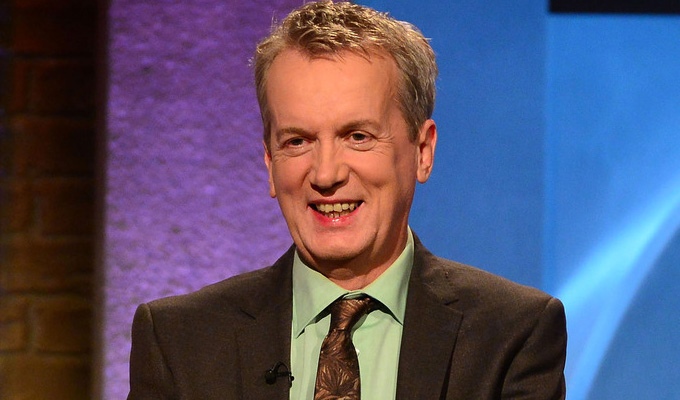 © BBC/Hat Trick/Ellis O’Brien
© BBC/Hat Trick/Ellis O’Brien 'I read poetry and punch the air'
Frank Skinner on his love of verse
Frank Skinner may be a huge fan of poetry – but he doesn’t want to write it.
The comic even says the artform is similar to stand-up, in being about finding the precise words and perfect timing, but that’s not enough to persuade him to give it a bash.
Skinner has just written a book offering an introduction to appreciating poetry, and explained: ‘I read poetry and punch the air. I want to share that feeling with people who like intimacy and words and ideas - this is me shouting out the windows and saying you WILL like it.
But when Isy Suttie asked him if he would ever turn his hand to verse he said: ‘Categorically no! And that’s very odd because almost everything I’ve become obsessed with I’ve fancied my chances of pulling it off.’
Talking at the Chortle Comedy Book Festival this week, Skinner told his fellow comedian: ‘Poetry and comedy have very clear comparisons… I’m sure you’ve spent ages thinking of just the right word.
‘Poets are very keen to put a significant word at the end of a line or use the line break for a bit of tension. A page of poetry an environmentalists’ nightmare, there’s blank space everywhere.’
‘Most people, when they read a poem, don’t give too much thought to the structure or the metre or the rhythm and why the line breaks there, and why that particular word was used, but I’m fascinated by that. It’s like the incidental music in movies – you don’t notice it but it’s massively influential in what you feel.’
In his book, How To Enjoy Poetry, Skinner uses ‘Pad, pad' by Stevie Smith, a seemingly simple 77-word poem to explore the multitudes of meaning and a deceptive depth of emotion poetry can carry.
Skinner called the book a ‘gateway drug’ into other poetry and an ‘intellectual stocking filler’ and confessed that: ‘I was offered the chance to write a 45,000 word book or a 7,000 word book’ - but chose the shorter version.
He also said he chose to analyse a piece of work that was easy to get to grips with, saying: ‘ Some poetry wears its complication on its sleeve. It’s better to present the reader with something they kind of get.’
But he was also careful to admit his limitations, saying he was happy to grapple with more complex verse without fully understanding every nuance. ‘I don’t need to swallow I can just chew,’ he said.
Skinner was also keen to stress that the art should be appreciated in the way it was initially intended, noting: ‘Whenever I see poetry on the telly they’re a little bit unsure about it, so what they’ll often do is they will set it to music ... but poetry comes its own music.’ And he quoted poet Don Paterson who said: ‘Setting a poem to music is like viewing a great painting through stained glass.’
Skinner also waded into the debate on whether you can separate the art from the artist, citing Rudyard Kipling’s inspirational poem If.
‘Kipling’s absolutely cancelled,’ he said – citing the poet’s pro-Empire views. ‘But the poem still works. It could apply to you gong for a job interview, where it comes from is irrelevant. Like Yeats said, "the personal rots away".’
Skinner said he was also keen to embrace more contemporary performance poetry, saying metaphorically: ‘I need a 17-year-old person of colour to take me out the town I’d like to be the old guy at the disco.’
• The comedy book festival continues today with Caimh McDonnell and Dave Cohen on self-publishing at 5pm, Laura Lexx at 7pm and Daliso Chaponda at 9pm. Click here for full details of all the festival’s sessions.
Meanwhile, full season passes are still available for £49 here, giving full access to all 22 sessions – those you’ve missed will be available on demand after the festival is over for a month – plus six months' access to NextUp’s library of stand-up specials, a bottle of wine, and discount on festival books.
Published: 18 Nov 2020






